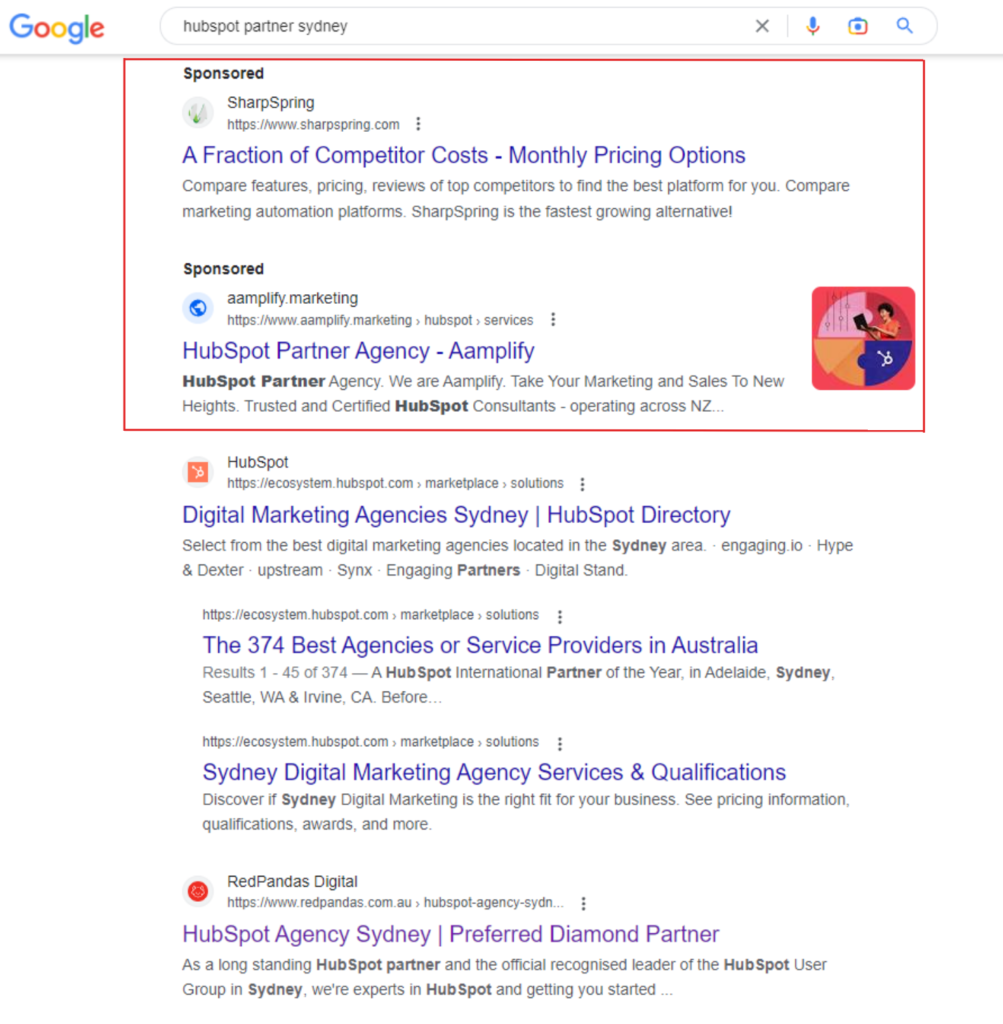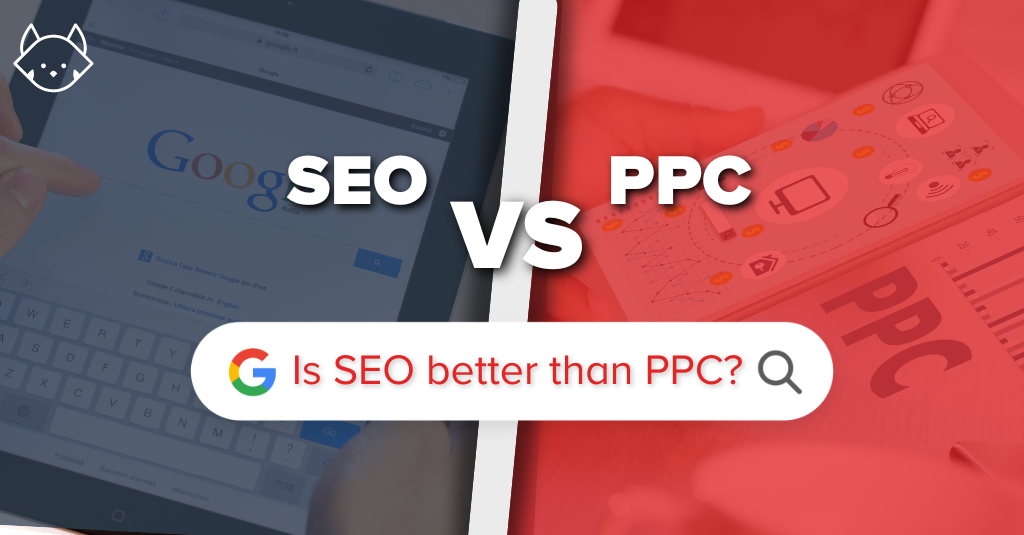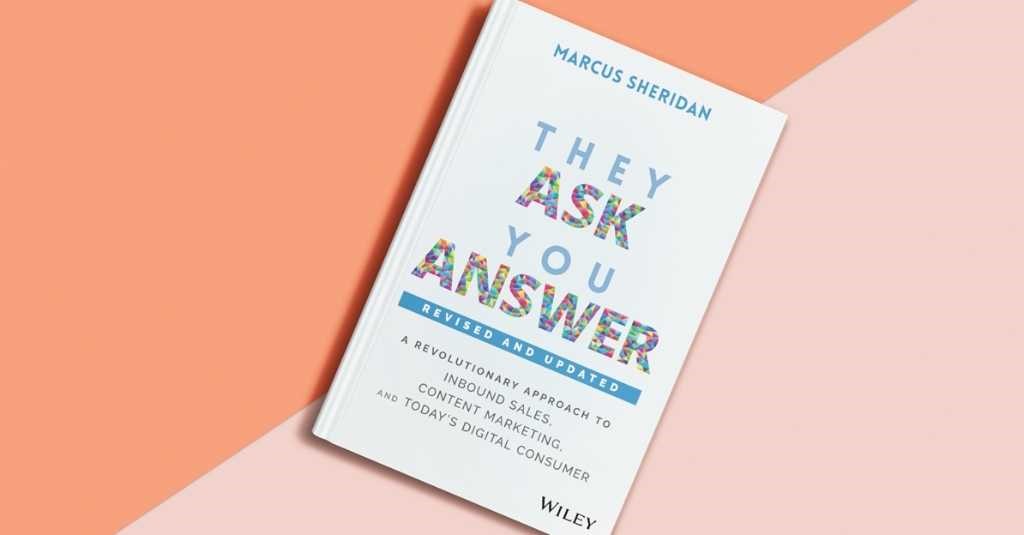Are you struggling to decide between using SEO or PPC for your business’s digital marketing strategy? While both have the capability to markedly increase traffic, leads and sales, you might not know when to use one over the other.
In this article, you’ll learn about the pros and cons of SEO and PPC and understand which might be right for you.
What is SEO?
If you’re trying to decide between SEO and PPC, it’s important to understand the differences between them before you make a decision. So, let’s take a look at what SEO is all about.
SEO involves improving your website’s visibility in organic search results on search engines like Google and Bing. By optimising your website and its content, you can rank higher in search results and attract more traffic to your site.

The only frustrating thing about SEO is that it’s a long-term strategy that requires ongoing effort to maintain and improve your ranking. In saying that, it can generate traffic, leads and sales for years to come if you do it right.
When it comes to implementing SEO on your website, the most important thing to do is publish transparent, accurate and valuable content on your website. This simple action by far trumps anything else you could possibly do.
Other than this, implementing SEO might involve things like:
- Optimising meta descriptions
- Using semantic HTML for your site structure
- Adding alt tags to all images
- Building high quality backlinks
- Conducting keyword research and using these across the website to rank for particular keywords
Of course there are many other things you can do, this is a small example of some of the things that SEO involves.
As you can tell, implementing SEO doesn’t involve any advertising cost, however, you’re going to need an expert to do the work for you (unless you’re an SEO and content expert yourself).
This means hiring a full timer for a minimum of 6 months before you even start to see results. And this is where PPC differs drastically…
What is PPC Advertising?
PPC (also known as pay-per-click advertising) is a form of online advertising that allows you to place ads on search engines.
One of the key features of PPC, which is also something that makes it extremely attractive as a revenue generating channel, is that you only pay when someone clicks on your ad and visits your website.
It can provide immediate results and allow you to measure the impact of your ad campaigns in real-time.

To run PPC Ads, advertisers will bid on specific keywords, and their ads will be displayed when someone searches for those keywords or meets the criteria they’ve set. In this way, you can be really targeted around what exactly you’re popping up for on Google.
You can also decide how much you spend, which means you can keep costs low. In saying that, if you’re in a very competitive industry, you might be paying higher amounts per click, which may make this endeavour quite expensive. In less competitive industries, you might only pay $2 per click, but in more competitive industries, you could pay up to $50 per click or more. On top of this, it’s quite technical to optimise and maintain solid results, so you’ll not only have to spend money on advertising, but also on experts to run the ads for you.
To choose the right approach for your business, it’s important to weigh the advantages and disadvantages of both SEO and PPC. In the next sections, you’ll learn about the pros and cons of both approaches which will help you make an informed decision.
Pros and Cons of SEO
SEO Pros
- Long-term strategy that will continue to generate traffic once working
- Improves your website’s authority and reputation
- Helps build trust
- Cost-effective in the long run
Let’s delve into each of these!
Long term strategy that will continue to generate traffic once working
While it may take time to see results, this might not actually be a bad thing. See, in the long term, SEO has a powerful effect of continuing to generate traffic, leads and sales. In other words, once you get it right, the proverbial floodgates have opened.
Improves your website’s authority and reputation
In order to improve your SEO, you need to focus on creating high-quality, informative, and engaging content. This ultimately helps you become a trusted advisor in your industry and positions you as an authority in your space, which only helps you close more deals.
Helps build trust
Let me ask you a question: do you find the website that appears first on Google search results more trustworthy than the one that appears on the tenth page? Most of the time, the answer to this is yes. By appearing at the top of search engine results pages, you can increase your trust with your target audience, making it more likely that they’ll choose your business over competitors.
Cost-effective in the long run
While SEO may require an upfront investment in time and resources, it can be highly cost-effective in the long run, as it generates sustained traffic, leads and sales without the ongoing costs of PPC ads.
SEO Cons
- Can take a long time to see results
- Requires ongoing effort to maintain and improve rankings
- Can be highly competitive, making it difficult to rank for certain keywords
- Limited control over search engine algorithms
Let’s delve into these!
Can take a long time to see results
If you’re doing SEO, you’re in it for the long haul *sigh*. Depending on your industry and competition, it may take months or even years to achieve better rankings in search results. This can be frustrating for the non-marketers in your team, especially if you need to get results fast.
Requires ongoing effort to maintain and improve rankings
SEO requires ongoing effort to maintain and improve rankings, as search engine algorithms and competition are constantly changing. This means you need to continuously update and optimise your website and content to keep up with the latest trends and best practices.
Can be highly competitive, making it difficult to rank for certain keywords
Depending on your industry and competition, it can be highly competitive to rank for certain keywords and search queries. This can make it difficult to achieve top rankings and generate traffic and visibility.
Limited control over search engine algorithms
While you can optimise your website and content for search engines, you have limited control over search engine algorithms, which can change at any time and affect your rankings and visibility.
While it can be frustrating to see rankings plummet after an update, it’s important to remember that these updates are often made with the goal of improving the user experience and promoting high-quality content.
To minimize the impact of future updates, website owners should focus on creating high-quality content that is useful to their target audience and follow Google’s guidelines for SEO best practices. It’s also important to regularly monitor website performance and make adjustments as needed to maintain or improve search rankings.
Pros and Cons of PPC
PPC Pros
- Provides immediate results
- Highly targeted and customizable
- You’re in control of your money and your results
- Provides greater control over ad placement and targeting
Let’s delve into these!
Provides immediate results
PPC provides immediate results, allowing you to generate traffic and conversions from day one. It also allows you to measure the impact of your ad campaigns in real-time, making it easy to optimise and adjust your strategy as needed. Rather than having to wait six months or longer, you can almost instantly drive traffic to your website.
Highly targeted and customisable
Imagine that when someone searches for a specific product, you could show up right in front of them, and point them to the specific aisle in your store where that product is located. The same goes for services. PPC ads are highly targeted and customisable to specific audiences and demographics, allowing you to reach the right people with the right message at the right time. Although, you’ll have to know how to setup campaigns correctly in order to do this effectively.
You’re in control of your money and your results
You’re never going to spend $2,000 and find out after spending that much that you don’t have any results. You get to decide your daily spend, and every day, you can see your results and optimise your campaigns as necessary. Because of this, you don’t have to worry about “what if it doesn’t work and I waste my money?”. If it’s not working, turn it off or optimise it and continue. Either way, you’re in complete control.
Greater control over ad placement and targeting
As opposed to SEO, with PPC, you have greater control over ad placement and targeting, allowing you to choose where and when your ads appear, and who sees them. For example, you can exclude certain keywords so that you don’t show up if someone searches that, even if they have another keyword in their search that you usually would show up for. Let’s say you exclude the keyword “mens” and you’re targeting the keyword “black boots for sale”, now you won’t show up for anyone who has the term “mens” in their search, even if they’re searching for “black boots”. This gives you complete control on when and how you show up in Google search results.
PPC Cons
- Can be expensive if not managed properly
- Requires ongoing optimisation and monitoring to ensure maximum ROI
- Can be highly competitive, driving up costs
- Can generate low-quality traffic if not targeted effectively
Let’s delve into these!
Can be expensive if not managed properly
While PPC can be cost-effective, it can also be expensive if not managed properly. This means you need to continuously monitor and optimise your ad campaigns to ensure you’re getting the most out of your ad spend, otherwise you might end up spending more than you realise.
Requires ongoing optimisation and monitoring to ensure maximum ROI
PPC requires ongoing optimisation and monitoring to ensure you’re getting maximum ROI from your ad campaigns. This means you need to continuously adjust and optimise your ad targeting, messaging, and budget to ensure you’re generating the most conversions and revenue. This may also come at a cost if you’re hiring an expert to do this for you.
Can be highly competitive, driving costs up
If many competitors are advertising for similar keywords, this will drive the cost per click up, which means you pay more per click. In some cases, I’ve seen the cost be as high as $15 per click. That’s why it’s so important to do keyword research before you start running your campaigns – you should have some idea on the approximate cost per click before you even start spending money on your campaigns. Regardless, one of the biggest cons of PPC is that cost can in some cases be high.
Can generate low-quality traffic if not targeted effectively
One of the biggest mistakes you can make with PPC is using the wrong types of keyword match types.
Let’s look at different keyword match types:
- Broad match: This is the default match type. When you use this match type, your ads may show for searches that include misspellings, synonyms, related searches, and other relevant variations.
- Phrase match: Ads will show for searches that include the exact phrase or a close variation of the exact phrase, which are designated with quotation marks I.e. “men’s shoes”.
- Exact match: Ads will show only for searches that exactly match the keyword or a close variant of it, which are designated with brackets I.e. [men’s shoes].
- Negative match: Ads will not show for searches that include the negative keyword, which are designated with a minus sign i.e. -women’s (following the example above, you might want to stop your ad from showing up when someone searches ‘women’s shoes’, in which case you would use –women’s as your negative keyword).
With different keyword match types, you’re able to specify what types of searches you show up for depending on the type of match type chosen. For example, if you use ‘black boots for women’ as a broad keyword, you’ll show up for terms like ‘black boots’, ‘black boots for men’, and ‘women’s blue boots’. On the other hand, if you use an exact match keyword for ‘black boots for women’, you’ll only show up when someone searches ‘black boots for women’ or a very, very closely related search term.
Depending on your objectives, the type of keyword you use may change, and depending on the type of keyword you use, the quality of your traffic will change. More targeted keywords will attract higher quality traffic, for example. Now, this is only one setting in relation to targeting – if you get other things wrong, you might end up generating very poor traffic quality, and this will negatively impact your results.
This is a con because it requires consistent work to ensure that high quality traffic is being generated, and if you get less diligent, you’ll start to generate low quality traffic, your conversion rate will drop, and your cost will decrease – and no one wants that, right?
Which is right for your business?
If you have money to invest for the long haul, SEO is the best way to go, because although it’s long term, the results will be worth it.
On the other hand, if you want results more quickly and don’t have the budget to invest over a longer period of time before seeing sales, then PPC is the best way to go.
While both have their pros and cons, it ultimately comes down to your budget, whether you’re looking for short term or long term results, and the competitiveness of the industry that you’re in.
This will save you from hiring an expert for SEO, and once you start to see results, you can then always hire an expert (or a team like RedPandas) to help you optimise your website for SEO while continuing to build out your PPC strategy.
If you liked this article, you might also find some of these useful:












